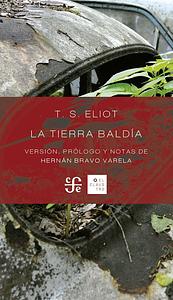Take a photo of a barcode or cover
challenging
dark
hopeful
mysterious
reflective
sad
tense
slow-paced
Plot or Character Driven:
Plot
Strong character development:
Complicated
Loveable characters:
N/A
Diverse cast of characters:
N/A
Flaws of characters a main focus:
N/A
Lauded for transforming the romanticism of the imagist movement into the hardened realism of the modernist , T. S. Elliot's most definitive work ''The Wasteland '' is an impenetrable account of a deteriorating personal life that mirrored the haggard scars of a freshly post war Europe.
Beginning with its most ubiquitous piece ,''The Burial of the Dead'' the poem captures the scale of loss instigated by what had been the greatest display of human destructiveness up to that point. Though describing the London of his times as a desolate desert, this Dante like hell feels evocative of our present day malaise, in a world where conflict has rendered progress inert.
In its brilliant opening which has become an indispensable part of the English lexicon,''April is the cruelest month breeding lilacs out of the dead land,stirring dull roots with spring rain'' juxtaposes the teeming intensity of returning life and commotion of spring against the stillness of winter. I love how it seems to turn the seasons into markers of human nature. How with all eras of great change and progress comes retaliating periods of rigidity and return.
I have not read interpretations of this poem as I don't think they'd do much for my enjoyment( i had read and loved this poem back when I was a pretentious 8th grader who knew nothing of its allusions but resonated with its doom). To me the power of the Wastelands lies in what it makes you feel, what it can open up for you. Having read it for all these years, when I return to it I find myself living in different stanzas. As a teen April was the cruelest month: the future was this great big evil that felt as inevitable as it would be destructive. But now at 23 I find myself in the desperate longing of ''II. A Game of Chess''. The lines ''Speak to me. Why do you never speak. Speak. What are you thinking of?'' tattoo themselves onto the forefront of my mind as I wade through the precarious world of queer identity where love takes to long and the body comes too quick. II. A Game of Chess distill early adulthood with a melancholic forthrightness that doubles as a warning of what can be when that time is left idle.
I wont really go into great detail about each segment of the poem as there is tonnes of writing about it already but those first two segments were formative introductions into the boundless possibilities of the medium
(fun fact: i did try to write my own response to this poem back in 8th grade, it was probably awful. I i'll go find it and attach it here if i do)
Beginning with its most ubiquitous piece ,''The Burial of the Dead'' the poem captures the scale of loss instigated by what had been the greatest display of human destructiveness up to that point. Though describing the London of his times as a desolate desert, this Dante like hell feels evocative of our present day malaise, in a world where conflict has rendered progress inert.
In its brilliant opening which has become an indispensable part of the English lexicon,''April is the cruelest month breeding lilacs out of the dead land,stirring dull roots with spring rain'' juxtaposes the teeming intensity of returning life and commotion of spring against the stillness of winter. I love how it seems to turn the seasons into markers of human nature. How with all eras of great change and progress comes retaliating periods of rigidity and return.
I have not read interpretations of this poem as I don't think they'd do much for my enjoyment( i had read and loved this poem back when I was a pretentious 8th grader who knew nothing of its allusions but resonated with its doom). To me the power of the Wastelands lies in what it makes you feel, what it can open up for you. Having read it for all these years, when I return to it I find myself living in different stanzas. As a teen April was the cruelest month: the future was this great big evil that felt as inevitable as it would be destructive. But now at 23 I find myself in the desperate longing of ''II. A Game of Chess''. The lines ''Speak to me. Why do you never speak. Speak. What are you thinking of?'' tattoo themselves onto the forefront of my mind as I wade through the precarious world of queer identity where love takes to long and the body comes too quick. II. A Game of Chess distill early adulthood with a melancholic forthrightness that doubles as a warning of what can be when that time is left idle.
I wont really go into great detail about each segment of the poem as there is tonnes of writing about it already but those first two segments were formative introductions into the boundless possibilities of the medium
(fun fact: i did try to write my own response to this poem back in 8th grade, it was probably awful. I i'll go find it and attach it here if i do)
challenging
mysterious
reflective
fast-paced
Plot or Character Driven:
N/A
Strong character development:
N/A
Loveable characters:
N/A
Diverse cast of characters:
N/A
Flaws of characters a main focus:
N/A
challenging
Plot or Character Driven:
N/A
Strong character development:
No
Loveable characters:
No
Diverse cast of characters:
No
challenging
reflective
fast-paced
emotional
reflective
fast-paced
Graphic: Rape, Abortion
i refuse to rate poetry books as i don't really know how to read them.
i always fathomed t.s. eliot as a pretentious bastard and i think im right but the overall imagery was great. i expected something static but it was awfully loud
I thought that art school had taught me to think more abstractly. This poem made me question that. I remain confused. It's super rich but I'm ranking it lowish because I feel like part of the point of writing is to communicate something that someone else can understand and I did not understand what this meant without help.
—————-
Things it reminded me of:
- Seventeen’s performance unit music video for “Spell”
- Surrealism, broadly
References I understood
- Various Biblical passages
- Shakespearean references
- Teresias (sp?)
- Various mythological references (Thank you, CWL 161 and CLSC 130. This is the only time I will thank Comp Lit 161.)
—————-
Things it reminded me of:
- Seventeen’s performance unit music video for “Spell”
- Surrealism, broadly
References I understood
- Various Biblical passages
- Shakespearean references
- Teresias (sp?)
- Various mythological references (Thank you, CWL 161 and CLSC 130. This is the only time I will thank Comp Lit 161.)
There are some incredible passages in "The Waste Land" that make it a poem everyone should read. The first few lines beginning with "April is the cruelest month..." (which is one reason the book club chose it for April's book) and on to the excellently rendered Game of Chess (section 2) throw off fantastic images juxtaposed with dead-on conversation snippits that pop up in your mind after you've put the text down.
Our group had an interesting discussion about references to other works we've read ("Paradise Lost," "The Odyssey," etc.). There was some controversy about whether Eliot truly believed in hope through resurrection (I came out on the "no" side due to the first few lines and the following:
He who was living is now dead
We who were living are now dying
With a little patience
Daffodils! Tulips! Fluffy little chicks! That's more Wordsworth's speed, no? "The Waste Land" presents a bleak, post World-War-1, post Spanish Influenza melange. Of course, T.S. was in the middle of a nervous breakdown and trouble with wifey (the latter an inspiration for section 3) on top of external factors. It's hard to believe the author also the author of "Old Possums Book of Practical Cats," the inspiration for the long-running musical, "Cats."
I do think that the deluge of literary references only a handful of people in the world could understand detract from what is certainly a work of art. The Norton critical edition is recommended for those who want to delve further behind the curtain: it is chock-full of both source material and criticism (positive and negative) that fleshes out the poem for the great unwashed.
Our group had an interesting discussion about references to other works we've read ("Paradise Lost," "The Odyssey," etc.). There was some controversy about whether Eliot truly believed in hope through resurrection (I came out on the "no" side due to the first few lines and the following:
He who was living is now dead
We who were living are now dying
With a little patience
Daffodils! Tulips! Fluffy little chicks! That's more Wordsworth's speed, no? "The Waste Land" presents a bleak, post World-War-1, post Spanish Influenza melange. Of course, T.S. was in the middle of a nervous breakdown and trouble with wifey (the latter an inspiration for section 3) on top of external factors. It's hard to believe the author also the author of "Old Possums Book of Practical Cats," the inspiration for the long-running musical, "Cats."
I do think that the deluge of literary references only a handful of people in the world could understand detract from what is certainly a work of art. The Norton critical edition is recommended for those who want to delve further behind the curtain: it is chock-full of both source material and criticism (positive and negative) that fleshes out the poem for the great unwashed.





